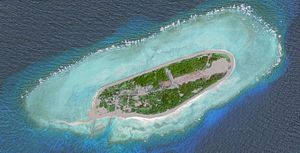Current Taiwanese President President Ma Ying-jeou plans to visit a disputed island in the South China Sea tomorrow, a presidential spokesperson said on Wednesday. Ma will visit Taiping Island, also know as Itu Aba, the largest natural island in the Spratly group. Mainland China, Malaysia, the Philippines, and Vietnam all have competing claims to the Spratlys. Taiwan has controlled Itu Aba, since 1956; today it houses around 200 personnel from Taiwan’s coast guard, navy, and air force.
Ma will be visiting the island ostensibly to greet the troops ahead of the Lunar New Year, according to Presidential Office spokesperson Charles Chen. Ma will be accompanied by “20 government officials, scholars, and experts,” according to Taiwan’s Central News Agency. It will be Ma’s first visit to the island, although his predecessor, Chen Shui-bian, also took a trip to Itu Aba in February 2008.
The timing in both cases is fascinating – in both instances, the sitting president was well into a lame-duck period, with a member of the opposition party already having been elected to replace him (in Chen’s case, Ma of the Kuomingtang or KMT had just won election; this time around, the Democratic Progressive Party’s Tsai Ing-wen is set assume the presidency on May 20). The DPP was invited to send an envoy along on Ma’s trip, but spokesperson Yang Chia-liang said the party had no plans to take part.
Itu Aba has come into focus recently thanks to its inclusion in the Philippines’ arbitration case against China’s claims in the South China Sea. Manila’s case argues that Itu Aba is a rock, not an island, under the provisions of the United Nations Convention on the Law of the Sea (UNCLOS) – meaning it would not be entitled to a 200 nautical mile exclusive economic zone. Taiwanese officials (including U.S. Representative Lyushun Shen, in an interview with The Diplomat) have countered that, as a land feature with naturally occurring fresh water and agricultural production, Itu Aba qualifies as an island. Taiwan is not directly involved in the arbitration– and indeed, was excluded from sending observers to the oral arguments – but Taipei is trying to make sure its case is heard nonetheless. Ma’s visit is part of that effort.
Taiwanese media previously reported that Ma was scheduled to visit Taiping in December for a ceremony to commission a new wharf and lighthouse. However, Interior Minister Chen Wei-zen and Coast Guard Administration Minister Wang Chung-yi presided over the December 12 ceremony instead. Taiwan still publicized the visit as an indication of Taiwan’s sovereignty over the disputed island, and of Itu Aba’s status as an island. After Chen and Wang’s trip, Taiwan emphasized that they ate food farmed on the island, and sent pictures of Itu Aba’s produce and livestock to the Asia Maritime Transparency Initiative as proof. The photos also showed Taiwan’s infrastructure on the island, including the new wharf and lighthouse as well as the pre-existing airstrip, hospital, and administration building.
Read in this context, Ma’s visit to Itu Aba is designed to even more firmly convey Taiwan’s control over the island, as well as the argument that Itu Aba is, in fact, an island rather than what Philippine Foreign Secretary Albert del Rosario called a “potemkin island” in his closing remarks before the arbitral tribunal. Though Taiwan officially claims all the Spratlys, as well as the Paracels and other features in the South China Sea, Itu Aba is the only feature actually occupied by Taiwan, and thus is critically important to preserving its presence in the region. Taipei has been moving to solidify its control over the island, including building new infrastructure (such as the recently completed wharf) and mulling boosting its defense presence.
Ma’s visit has sparked strong opposition from the American Institute in Taiwan, which functions as a de facto U.S. embassy in the absence of official diplomatic ties. “We are disappointed that President Ma Ying-jeou plans to travel to Taiping Island,” AIT spokesperson Sonia Urbom told Reuters, calling the move “extremely unhelpful.”
Likewise, Vietnam’s top official in Taiwan, Tran Duy Hai, said Hanoi “resolutely opposes” Ma’s visit to Itu Aba, saying, “If he goes, it will raise tensions in the area.”
Beijing however, was not bothered by the move, which it sees as in tandem with its own claims to the South China Sea. “Safeguarding national sovereignty and territorial integrity as well as safeguarding the overall interests of the Chinese nation is the common responsibility and obligation of compatriots across the straits,” Ma Xiaoguang, a spokesperson for the Taiwan Affairs Office, told reporters.
Taiwan has struggled to strike the right balance in its South China Sea approach, between staunchly defending its claims (which are virtually identical to mainland China’s, as they are based on the same maps created by the Republic of China) and positioning itself as a positive influence in the region, promoting the use of international law. Ma’s South China Sea Peace Initiative was designed to meet both ends. Without giving up any of Taiwan’s claims, the initiative called for all parties to shelve disputes, respect UNCLOS, and explore the joint development of resources. The plan never got any traction, though, having been overshadowed by China’s artificial island-building and the Philippines’ arbitration case.
Ma’s visit to Itu Aba will bring the focus back to Taiwan, if only for a few days. As the saying goes, any publicity is good publicity – even scoldings from other regional players can achieve the purpose of reminding the world that Taiwan, too, is a player in the South China Sea.
































